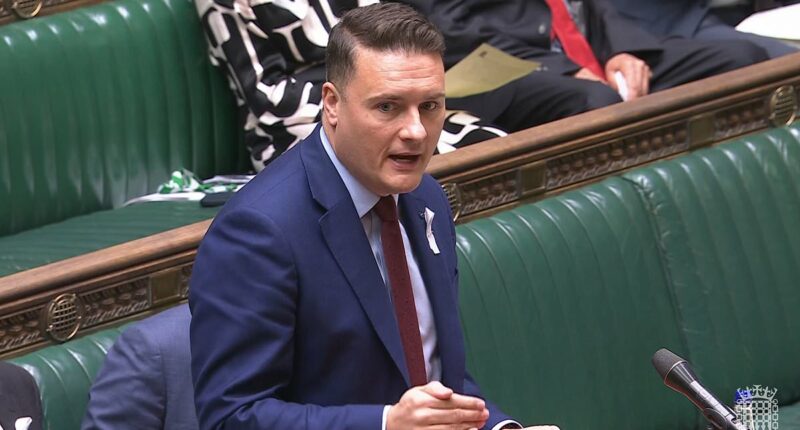Share this @internewscast.com
Wes Streeting has pledged to swiftly implement a national prostate cancer screening program, should it gain the endorsement of experts during a pivotal meeting this week.
The UK National Screening Committee is set to convene on Thursday to evaluate the latest data concerning the costs and benefits of such a program before making a much-anticipated recommendation.
Addressing members of parliament, the health secretary expressed his intent to carefully consider the advisory panel’s findings, weighing the arguments thoroughly to determine the best course of action.
While ministers typically adhere to the panel’s guidance, they are not legally bound to do so, leaving open the possibility of launching the program even if the panel advises against it.
During a session on health questions in the Commons, Mr. Streeting also took a moment to commend former Prime Minister David Cameron for his significant public service. Cameron has openly discussed his own prostate cancer diagnosis and has been a vocal advocate for screening, helping to raise public awareness.
Mr. Streeting remarked, “I commend Lord Cameron for his openness, because raising awareness, as we know, encourages men to come forward and leads to more diagnoses.”
‘So he has done a great public service in talking about his own experience.’
NHS England said there has been a 333 per cent rise in the number of visits to the NHS website pages on prostate cancer following Lord Cameron’s revelation on Sunday, with the equivalent of one visit every 21 seconds on Monday.

The Daily Mail is campaigning to end needless prostate deaths
Prostate cancer is now the most common cancer in the UK, with 63,000 cases and 12,000 deaths each year – but unlike breast, bowel and lung cancer, there is currently no national screening programme.
The Daily Mail is campaigning to end needless prostate cancer deaths and for a national prostate cancer screening programme, initially targeted at high risk men, such as those who are black, have a family history of the disease or particular genetic mutations.
Responding to an MP’s question in the chamber, Mr Streeting said: ‘We’re expecting the draft recommendation.
‘There’s a three-month consultation period that follows but I do want to act quickly on the evidence and what the recommendations contain – not least because we know, as well as being a prevalent form of cancer, there’s also some groups, particularly black men, men with a family history of prostate cancer and men with BRCA mutations who are at higher risk.
‘Black men are twice as likely to die with prostate cancer than white men, so there is an imperative to act.
‘Whatever the recommendation we need to do much better on diagnosis and treatment of this terrible condition.’
More than 120 MPs signed a letter that former prime minister Rishi Sunak delivered to Mr Streeting on Monday, saying a prostate cancer screening programme would be a ‘legacy-defining advance for men’s health’.
A major study last month found screening men for prostate cancer slashes their risk of dying from the disease by 13 per cent, with one such death prevented for every 456 men checked – a figure that is comparable to existing breast and bowel cancer screening programmes.
David James, director of patient projects and influencing at Prostate Cancer Research, said: ‘It’s hugely encouraging to hear the health secretary say he wants to act quickly once the screening committee reports.
‘He clearly understands the scale of the problem – far too many men are still being diagnosed too late, and Black men and those with a family history face shocking additional risks.
‘If we’re going to save lives and close these massive gaps in the system, we need a screening programme, starting with those at highest risk.
‘It’s the only credible way to turn the tide on prostate cancer, because the status quo has failed.’

Rishi Sunak delivers letter to Wes Streeting at the Department of Health and Social Care
NHS England said it is diagnosing more cases of prostate cancer than ever before and urged men to get checks in an effort to catch the disease early when it is easier to treat and survival chances are higher.
Professor Peter Johnson, the national clinical director for cancer at NHS England, said: ‘Lord Cameron’s decision to speak about his treatment for prostate cancer can only help to highlight the importance of early diagnosis in tackling this disease.
‘Prostate cancer is the most common cause of cancer in men in the UK but it is also one of the most treatable with a timely diagnosis and treatment.
‘Lord Cameron was encouraged to get tested after hearing an interview on the topic, and I would urge anyone else with symptoms to also get themselves booked in for a test.’

















